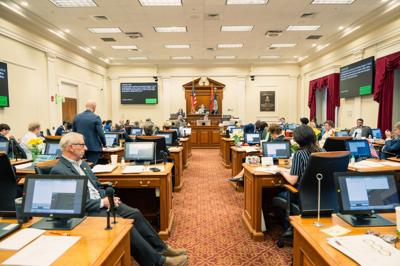
Metro Council chambers, August 2025
The Metro Council’s Nov. 4 meeting saw two hours of public comment from Nashvillians divided on a group of proposed zoning reform bills seeking to fill the gap in the area’s housing shortage.
One bill in particular, BL2025-1005, evoked the most debate Tuesday night. If passed, the bill would establish two new zoning districts within Metro Code: residential neighborhood and residential limited. These would allow for more affordable housing options like townhomes, courtyards, low-rise flats, triplexes and quadplexes.
The districts would not be automatically instituted, and the current bill provides councilmembers with only the option to propose the addition of the districts in their respective areas. Proponents of the bill feel it will provide additional housing options outside of higher-cost single-family homes.
“Our families are not all the same, and so we need the diversity of housing that reflects that,” said Paragon Mills resident Robin Lovett-Owen.
Supporters with groups like Nashville Organized for Action and Hope (NOAH) spoke at Tuesday's meeting, as well as others who say the districts are a first step in a larger push for housing reform across Davidson County.
Metro Council approves 10-year operating agreement for Opry Entertainment Group
“We need to lay the foundation for this to happen here in our community,” said Tom Negri, a community activist and former Loews Vanderbilt Hotel general manager who is now retired. "If you work here, you should be able to live here.”
In opposition to the bill is a group of Nashvillians who worry about the impact that higher density could have on their neighborhoods, specifically citing traffic and population growth. Some residents also worry about the impact on the city’s infrastructure and urged the council to defer voting on the bills until findings are released from a pending Metro infrastructure study.
Many of the dissenters attended Tuesday’s meeting wearing red and holding signs reading simply “No.” One of those was District 3 resident Linda Ferris. “We’re not against development,” said Ferris. “We’re in favor of smart development.”
The opponents also worry about the effect the bill would have on their neighborhood’s "character." District 23 resident Melissa Lockhart said she believes a density increase will “fundamentally change the character and livability of our neighborhoods.”
“These areas were designed for single-family homes with space, safety and stability in mind,” Lockhart said.
Others opposing the zoning proposal don’t believe that Nashville is facing a housing crisis, despite a recent Metro study that found the city will need 90,000 additional residential units within the next decade.
Housing diversity is seen as key to alleviating catastrophic home prices
“I understand Nashville has a housing issue, but I don’t believe it’s nearly as bad as we’re led to believe,” said Chance Jones of District 24. “Plus, I don’t think it’s beneficial to destroy the very thing that attracts people to these quaint neighborhoods.”
The council ultimately approved the bill on second reading, but deferred its third and final reading to Dec. 4.
Other housing-focused bills, such as an ordinance to expand options for detached accessory dwelling units (DADUs), were also discussed Tuesday night but received less debate. This bill was approved on second reading, with its third and final reading also pushed to Dec. 4.
The council deferred second reading of a bill to implement height limits for certain residential buildings until Dec. 4 as the body's 40 members await a recommendation from the Metro Planning Commission. Second reading of a bill to implement a voluntary housing incentive program was deferred until January.
Councilmembers said they plan to further engage with the community on the bills as they prepare for final consideration.







